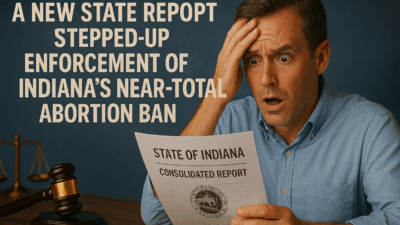A new state report recommends stepped-up enforcement of Indiana’s near-total abortion ban, including financial penalties for noncompliant hospitals and expanded oversight by senior health officials.

Much of the Indiana Department of Health (IDOH) report, released earlier this week, emphasizes existing policies and requirements, like mandated abortion reporting and informed consent forms.
But several enforcement changes go further, including possible financial penalties for noncompliant hospitals and formal escalation of abortion-related issues to top IDOH leadership.
Indiana is a state that supports Life, and the people’s representatives have enshrined those protections for the unborn into state law.
– Republican Gov. Mike Braun
In a letter, Gov. Mike Braun framed the effort as an extension of his broader “pro-life means pro-family” agenda.
In January, he directed all state agencies to ensure Indiana’s abortion laws are “fully and faithfully executed,” including mandatory cooperation on terminated‑pregnancy reporting, as well as a health department review of enforcement practices. Findings were due by July 1.
“Indiana is a state that supports Life, and the people’s representatives have enshrined those protections for the unborn into state law,” Braun wrote in his recent letter. “We are taking the necessary steps to make sure those laws are properly implemented.”
Internal, enforcement changes at IDOH
Under state law, abortion care providers must submit Terminated Pregnancy Reports (TPRs) to the IDOH after each abortion procedure.
Providers must report within 30 days if the patient is 16 or older and within three days if younger than 16. Each of the reports should include demographic, medical and procedural information.
But State Health Commissioner Lindsay Weaver pointed to ongoing challenges with enforcement — namely two hospital systems, IU Health and Eskenazi Health, “that have refused to file TPRs.” Indiana State Health Commissioner Lindsay Weaver (Photo courtesy Indiana Department of Health)
“This is a significant challenge for IDOH because it does not allow the agency to fully capture data regarding provision of abortions in Indiana and ensure appropriate compliance with Indiana’s laws,” Weaver wrote in the new report.
The hospitals have based their refusal on a national reproductive health privacy rule, which was recently vacated by a federal judge in Texas.
Weaver said IDOH “is currently working with the hospitals and the Indiana Attorney General’s Office to resolve the dispute” over TPR filings.
To “address noncompliance swiftly and proportionately,” the health department has also started to develop new rules that would allow the agency to impose financial penalties on hospitals and ambulatory surgical centers that fail to comply with abortion-related reporting laws, Weaver noted. It’s not yet clear how much those fines could be or when exactly they could be imposed.
Currently, enforcement primarily centers around punitive licensing actions or criminal referrals.
IDOH also pledged greater collaboration with other state agencies, including the Professional Licensing Agency (PLA) and the Department of Child Services (DCS), as well as new continuing education efforts to help providers better understand Indiana’s abortion statutes.
Weaver said collaboration with the Office of the Attorney General would include increased data sharing and more efficient communication around legal referrals. Joint efforts with PLA seek to address provider noncompliance through disciplinary action, and “strengthen(ed) communication” with DCS will especially focus on cases involving minors under the age of 16.
Ensuring “consistent and timely submission” of TPRs to DCS “will support child welfare investigations and ensure compliance with mandatory reporting laws,” Weaver wrote.
Abortions down statewide
Indiana Right to Life praised Braun’s actions, calling the new report “encouraging.”
“Hoosiers, in which so many want to love and support both moms and babies, will gain clarity on many issues from this report that underscores IDOH’s intent to work closely with other agencies, including the Office of the Attorney General, and to ensure Gov. Braun’s directive is carried out,” said Mike Fichter, the group’s president and CEO.
The release comes as Indiana marks its first full year under a near-total abortion ban enacted in 2022 and upheld by the state Supreme Court in 2023. An IDOH report released in May showed that just 146 abortions were reported statewide in 2024, down from thousands annually in prior years.
Despite the drop, Braun’s office said changes at IDOH and other state agencies are necessary to ensure “full compliance” and transparency post-Roe v. Wade.







